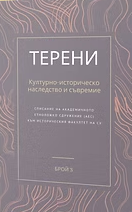The Social Impact of the Servants in Bulgaria during 19-20 century
DOI:
https://doi.org/10.60053/TER.2018.3.148-161Abstract
This article traces the history of servants in Bulgaria after the liberation of Ottoman Empire (1878). Unlike the West Europe, in the Balkans servant society was not developed within the social boundaries. In the beginning of 19 century there were small features which showed indication of a system, similar to the servant class in the West. The interpreters can see them into the slave roots or in the more civil system of hiring someone to help for the house work. Due to the new government and cultural appropriation from the West, Bulgarian society started to integrate some of the features common to countries like Germany, France and England. One of them was the creation of the servant system, which was accepted as common only for the rich parts of the society. Through newspapers and researches this article attempts to show this particular part of the society which in the end developed its canons, rights, rules and institutions. Despite that with the coming of the Communist regime in 1944 this servant public system was destroyed.
References:
Gunchev 1933: Gunchev, G. Vakarel - antropogeografski prouchvania. Sofia, 1933
Georgiev 1983: Georgiev, G. Sofia i sofiantsi 1878-1944. Sofia, 1983
Ilieva 1989: Ilieva, V. Nyakoi formi na gurbetchiystvo v Gabrovsko ot Osvobozhdenieto do sredata na HH vek. V: Etnografski sbornik „Etar“,Gabrovo, 1989, t. І, s. 95-112.
Kostentseva- Metsger 2008: Kostentseva- Metsger, Rayna Mihaylova. Moyat roden grad Sofia v kraya na XIX i nachaloto na XX vek i sled tova. Sofia, 2008.
Kostentseva 1979: Kostentseva, Rayna. Moyat roden grad. Sofia, 1979
Hristov 2010: Hristov, P. Trudova migratsia i promyana v traditsionnia kostyum (po materiali ot Sredna Zapadna Bulgaria). V: Mnogoobrazie v edinstvoto, 1, Sofia:Sayuz na uchenite v Bulgaria, 2010, ISSN 1314-0825, s. 162-173
Schwarz 1999: Schwarz, Leonard. English Servants and Their Employers during the Eighteenth and Nineteenth Centuries.// The Economic History Review, New Series, Vol. 52, No. 2 (May, 1999), pp. 236-256
Hristov: Hristov, Petko. "Trans-border Exchange of Seasonal Workers in the Central Regions of theBalkans (19th – 20th Century)". Ethnologia Balkanica 12:215- 230.
Pechatni periodichni broeve:
Sp. Kragosvet. Sofia, 1929, br. 5, s.15
v. Vestnik na zhenata. Sofia, 1926-1927; 1928-1929; 1929-1930;
v. Pryaporets.Sofia, 1930, mart
v. Shturets. Sofia, 1941, br. 441, s. 2
Gergyovden.V.Shturets. Sofia, 1935, br.125, s.1
Dimitrovdenska hronika.V. Shturets. Sofia, 1935, br. 152, s. 1
Dimitrovdenski. V.“ Shturets“. Sofia.1935, br. 152, s. 1
Kak prekarahme Dimitrovdena. V. Shturets. Sofia, 1934, br. 100, s. 6
Na sluginskia pazar.V. Shturets.Sofia, 1993, broy 20, s. 1
Politicheska borba. V.Shturets. Sofia, 1939,br. 361,s. 1
Sedmichen dnevnik. Razgovor s edna sluginya.V.Shturets. Sofia, 1993, br. 47, s. 3
Sluginski pazar.V.Shturets. Sofia, 1941, br. 459, s. 1
Sluginskiyat vapros. V. Shturets. Sofia, 1938, br. 284, s. 3
Onlayn iztochnitsi:
Nedeva, Todorka. „Staro Tarnovo. Konkurs za nay-krasiva sluginya “Mis Cheshma”. Tarnovo, 2013, http://www.borbabg.com/?action=news&news=28535
Stoilov, Vanyo. Baba Maria bila sluginya na generala, koyto ne dal dashterya si na Atatyurk. Sofia, 2015, https://www.24chasa.bg/novini/article/5035960
Tsenkova, Iskra. Plat za prodan. Sp. Tema. Sofia, http://www.temanews.com/index.php?p=tema&iid=230&aid=5670






